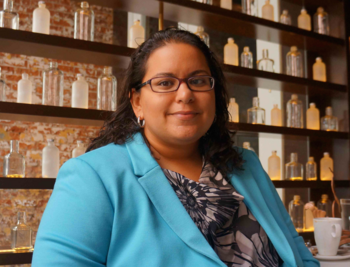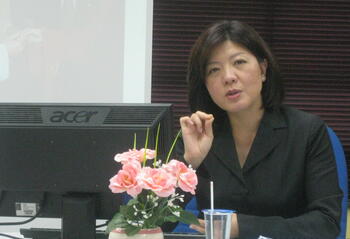Stanford Scholar Examines Sectarianism and Urban Segregation in Baghdad [VIDEO]
As part of the Program on Arab Reform and Democracy speaker series, Director of The Markaz: Resource Center Mona Damluji examined the impact of the US-led occupation of Iraq on sectarian-based urban segregation in Baghdad. In a talk held on February 3, 2016, she argued that the sectarian-based segregation that has shaped urbanism in Baghdad is a direct outcome of the 2003 U.S.-led invasion and occupation of Iraq. The "post"-occupied city is characterized by the normalization of concrete “security” blast-walls that choke urban circulation and sever communities. The notorious blast walls -- or "Bremer Walls" -- perpetuate and intensify conditions of urban segregation. As the summer's surge of anti-government protests in Baghdad demonstrate, the short-sighted nature of this militarized solution to sectarian-based violence has proven to be a superficial and unsustainable fix to the deep dilemma of sectarian segregation codified in Iraq’s political system. The presentation also examined the context for recent public dissent on the streets of Baghdad through the story of the capital city's fragmentation between 2006 and 2007.

The Containment of Politics in Egypt
Abstract
With the nearing of the fifth anniversary of the January 25 Revolution, this panel examines the nature of politics under the rule of the current military sponsored regime in Egypt. What implications will the recent legislative elections have for political stability and the cohesion of the ruling coalition? How is the regime responding to the various economic challenges it currently confronts? In what ways has the persistence of state repression affected and shaped the space for political contestation and resistance?
Panelists
Joel Beinin
Donald J. McLachlan Professor of History,
Stanford University
Lisa Blaydes
Associate Professor of Political Science,
Stanford University
Amr Hamzawy
ARD Visiting Scholar,
CDDRL, Stanford University
Nancy Okail
Executive Director,
The Tahrir Institute for Middle East Policy
(via Skype)
Hesham Sallam
Associate Director, ARD
CDDRL, Stanford University
Moderator:
Larry Diamond
Senior Fellow, FSI;
Senior Fellow Hoover Institute,
Stanford University






[[{"fid":"221614","view_mode":"crop_870xauto","fields":{"format":"crop_870xauto","field_file_image_description[und][0][value]":"Egypt panel flyer","field_file_image_alt_text[und][0][value]":false,"field_file_image_title_text[und][0][value]":false,"field_credit[und][0][value]":"","field_caption[und][0][value]":"","field_related_image_aspect[und][0][value]":"","thumbnails":"crop_870xauto"},"type":"media","field_deltas":{"7":{"format":"crop_870xauto","field_file_image_description[und][0][value]":"Egypt panel flyer","field_file_image_alt_text[und][0][value]":false,"field_file_image_title_text[und][0][value]":false,"field_credit[und][0][value]":"","field_caption[und][0][value]":"","field_related_image_aspect[und][0][value]":"","thumbnails":"crop_870xauto"}},"link_text":null,"attributes":{"width":"870","class":"media-element file-crop-870xauto","data-delta":"7"}}]]
CISAC Central Conference Room
Encina Hall, 2nd Floor
616 Serra St
Stanford, CA 94305
ARD welcomes Egyptian intellectual Amr Hamzawy as a visiting scholar
The Program on Arab Reform and Democracy at Stanford’s Center on Democracy, Development, and the Rule of Law is pleased to welcome Egyptian academic and Former Member of Parliament Amr Hamzawy as a visiting scholar for the 2015-16 academic year. Hamzawy, who teaches political science at Cairo University and the American University in Cairo, brings to the program a deep knowledge of Middle East politics and specific expertise on democratization and reform processes in the region. A former Senior Associate at the Carnegie Endowment for International Peace, Hamzawy’s research focuses on questions of political change, human rights, and the rule of law in Egypt. He is a daily columnist for Al-Sherouk, an independent Egyptian newspaper, and writes regularly on the role of civil society actors and parties in Egypt’s often restricted political arena. Hamzawy is a former member of the Egyptian National Council for Human Rights, and was elected to serve in Egypt’s first parliament after the outset of the January 25 Revolution before it was dissolved in the summer of 2012.
Hamzawy will spend his residency at CDDRL working on a research project on the liberal elite and reemergence of autocracy in Egypt. His residency is generously funded by a grant from the Carnegie Corporation to support scholars from the Arab world. In the interview below, Hamzawy describes his current project and research plans. Hamzawy will be sharing his research findings with the CDDRL community in a seminar on October 27.
What are your research goals and priorities?
While at CDDRL, my research objective is to analyze contemporary liberal discourses on democracy and human rights in Egypt. The fact that the majority of Egyptian liberals called on the military establishment - prior to the July 3, 2013 coup which deposed the elected president Mohamed Morsi - to interfere in politics and terminate the emerging pluralist dynamics warrants an in-depth examination. Equally puzzling, is the readiness of Egyptian liberals to allow the former minister of defense and current president Abdel-Fattah al-Sisi’s rise to power, to accept a subordinate role in an increasingly restricted public space, and to tolerate without any noticeable resistance the emergence of a new autocracy in Egypt.
What has your research uncovered?
The research journey has been going in some fascinating directions and yielding some interesting answers. For instance, one set of factors pertains to the formation of the modern Egyptian state and the long-standing dependency of liberal elites on successive autocratic rulers and governments. Another revolves around historical legacies of mistrust and fear towards religious-based social movements and political actors. These legacies have contributed to the tendency of liberals to side with autocrats against popular opposition currents. Finally, the predominance of rent-seeking tendencies inside the state bureaucracy and among economic elites has limited the integration of liberals into Egypt’s social fabric. While there are fascinating historical analogies between the current moment and previous experiences in Egypt from the nineteenth and twentieth centuries, my research will remains focused on the contemporary era.
How is your experience in Egyptian politics informing your current projects?
Throughout the last four years, and while putting on different institutional hats and operating in very different contexts, I have collected first-hand insights on liberal narratives on the formation of the Egyptian state and state-society relations. These experiences also deepened my understanding of liberals’ discourses on their historical encounters with religious forces, their social and political preferences, and their views on the wider public—which some key liberal figures have been willing to disenfranchise to avoid Islamist victories in the polls. These insights, as well as my own experiences as an elected member of the Egyptian People’s Assembly of 2012, the first legislature that was elected freely and without government manipulation, will inform the research.
What are the most important factors that undermined the movement that supported the January 25, 2011 Revolution in Egypt?
That is a tough question. It is easy to state that neither the military establishment nor the vastly entrenched security apparatus wanted the January 25, 2011 Revolution. They feared that it could lead to a democratic transition in which their roles, benefits, and privileges would have been limited or at least subjected to greater scrutiny. Also, there is no doubt that the rent-seeking economic elites and various forces of the Mubarak regime were heavily invested in blocking an orderly transition to democracy. These are facts that have been well documented and researched.
However, no less significant is the recurrent retreat of liberal elites from pluralist processes and procedures. It appears as if Egyptian liberals have never been ready to support a democratic opening that could bring Islamists to power. Liberals have also been reluctant to shoulder the burden of standing against the autocratic ways of the military and the security establishment, or to help civil society and human rights groups garner more popular support. To explain the root causes and impacts of Egypt’s illiberal liberals is the task of my current research project.

Pious Neoliberalism and Islamic Charity in Egypt
Abstract:
Islamic charities occupied a critical space in Mubarak-era Egypt. While there are a plethora of organizational types and activities, Mona Atia describes a particular type of work performed by Islamic charities as a merging of religious and capitalist subjectivity, or pious neoliberalism. Pious neoliberalism describes how Islamism works in conjunction with neoliberalism rather than as an alternative to it. It represents a new compatibility between business and piety that is not specific to any religion, but rather is a result of the ways in which religion and economy interact in the contemporary moment. In Egypt, pious neoliberalism produces new institutions, systems of knowledge production and subjectivities. This lecture explores the relationship between Islamic charity and Egypt’s variegated religious landscape. The author will discuss how Islamic charities helped spread Islamic practices outside the space of the mosque and into everyday life/spaces and their impact on development in Egypt.
Speaker Bio:

Mona Atia is Associate Professor of Geography and International Affairs at the George Washington University. She received her PhD in Geography at the University of Washington, where she received the 2008 Distinguished Dissertation Award. She holds a MSc in Cities, Space and Society from the London School of Economics and a BS in Business Administration from the University of California at Berkeley. Professor Atia is a critical development geographer whose areas of expertise include Islamic charity and finance, philanthropy and humanitarianism, and the production of poverty knowledge. She is author of Building a House in Heaven: Pious Neoliberalism and Islamic Charity in Egypt (University of Minnesota Press, 2013). She currently holds an NSF CAREER Award for her project "The Impact of Poverty Mapping on the Geography of Development."
This event is co-sponsored by the Sohaib and Sara Abbasi Program in Islamic Studies.
[[{"fid":"218621","view_mode":"crop_870xauto","fields":{"format":"crop_870xauto","field_file_image_description[und][0][value]":"Mona Atia flyer","field_file_image_alt_text[und][0][value]":"","field_file_image_title_text[und][0][value]":"","field_credit[und][0][value]":"","field_caption[und][0][value]":"","field_related_image_aspect[und][0][value]":"","thumbnails":"crop_870xauto","pp_lightbox":false,"pp_description":false},"type":"media","attributes":{"height":"540","width":"870","class":"media-element file-crop-870xauto"}}]]
Reuben Hills Conference Room
2nd Floor East Wing E207
Encina Hall
616 Serra Street
Stanford, California 94305
Mark Lorey of World Vision speaks on faith-based international NGOs
Mark Lorey, vice president for Child Development and Program Effectiveness at World Vision International, spoke on his experience working for a faith-based international NGO on human rights issues at the Stanford Program on Human Rights’ Winter Speaker Series, U.S. Human Rights NGOs and International Human Rights, on February 18, 2015.
Lorey addressed the Stanford audience from the Christian perspective and outlined World Vision’s mission for the sustained well-being of children. The projects and other initiatives that World Vision has in place often have a strong religious component to them. For example, many of the projects aim to empower local religious leaders to mobilize marginalized populations through deep faith and commitment to their God. He focused on the stigma and judgment that is attached to HIV/AIDS, especially coming from those of strict religious orientation. In believing in the capability for change, he presented a video that highlighted the experience of a devout Armenian Orthodox priest that once spoke adamantly against those inflicted with HIV/AIDS, but that through a World Vision educative program became a strong advocate for the victims of the disease.
Nicolle Richards, a Stanford undergraduate whose commitment to faith-based organizations has shifted considerably throughout her Stanford career, moderated the event. Richards pressed Lorey on World Vision’s work and the work of faith-based organizations more broadly. She questioned the contrast between faith-based and secular NGOs’ mission and impact in the field; the ethics involved when working with children of secular backgrounds; incorporating religious differences into their community work; and the details of a particular World Vision controversy over their decision to not hire people of different sexual orientations. Lorey struggled to answer many of these sensitive and important questions, leaving the audience with an impression that World Vision battles internally with its constraints as a faith-based organization and that the work of faith-based organizations may not be as impactful as we hope. There was a particularly uncomfortable tension in the room when Helen Stacy, director of the Program on Human Rights, interjected in the discussion, asking Lorey to speak in more detail about World Vision’s recently revoked anti-gay policy that inhibited the hiring of peoples in same-sex marriages. Unwilling to speak about this in an open forum, Lorey asserted that while it is an important issue, it is not one that he wished to dwell on.
Questions from the silenced audience were sparse, but addressed the prevalent gender inequalities among faith-based leaders and concerns about being overly authoritarian in the Good Samaritan model towards human rights work abroad.
Dana Phelps, Program Associate, Program on Human Rights

The End(s) of Compassion? Buddhist Charity and the State in Taiwan
ABSTRACT
The Buddhist Compassion Relief Tzu Chi (Ciji) Foundation from Taiwan is perhaps one of the largest Buddhist charities in the Chinese world today. This talk traces how Tzu Chi developed under the “regime of civility” in Taiwan. The same regime also contributed to the recent controversies between Tzu Chi and the Aborigines. I argue that the tension between the Buddhist non-governmental organization and the Christian Aborigines has to do with the inequality under the regime of civility: on the one hand, the Aborigines have been marginalized as the “subject” of the civility campaign by the state; and, on the other hand, the same regime of civility is what allows the Buddhist charity to thrive in civil society. This talk raises the question whether civility could turn against civil society.
SPEAKER BIO

C. Julia Huang is a Professor of Anthropology at National Tsing Hua University, Taiwan, and currently a Visiting Scholar at the Ho Center for Buddhist Studies at Stanford University. Huang has published articles in the Journal of Asian Studies, Ethnology, Positions, Nova Religio, the Eastern Buddhist, and the European Journal for East Asian Studies. Her book, Charisma and Compassion: Cheng Yen and the Buddhist Tzu Chi Movement (Harvard University Press, 2009) is an ethnography of a lay Buddhist movement that began as a tiny group in Taiwan and grew into an organization with ten million members worldwide. Huang has recently completed a book manuscript, The Social Life of Goodness: Religious Philanthropy in Chinese Societies (with Robert P. Weller and Keping Wu). She is currently working on a project on the Buddhist influences on cadaver donations for medical education in Taiwan.
This event is part of the Taiwan Democracy Project.








